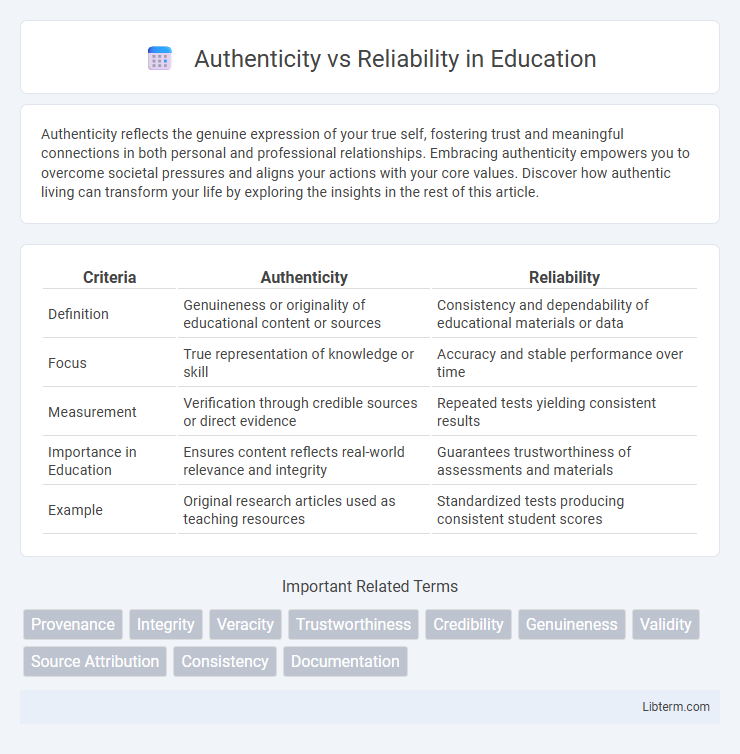Authenticity reflects the genuine expression of your true self, fostering trust and meaningful connections in both personal and professional relationships. Embracing authenticity empowers you to overcome societal pressures and aligns your actions with your core values. Discover how authentic living can transform your life by exploring the insights in the rest of this article.
Table of Comparison
| Criteria | Authenticity | Reliability |
|---|---|---|
| Definition | Genuineness or originality of educational content or sources | Consistency and dependability of educational materials or data |
| Focus | True representation of knowledge or skill | Accuracy and stable performance over time |
| Measurement | Verification through credible sources or direct evidence | Repeated tests yielding consistent results |
| Importance in Education | Ensures content reflects real-world relevance and integrity | Guarantees trustworthiness of assessments and materials |
| Example | Original research articles used as teaching resources | Standardized tests producing consistent student scores |
Understanding Authenticity and Reliability
Understanding authenticity involves verifying the originality and genuineness of information or sources, ensuring that data or content is credible and unaltered. Reliability emphasizes the consistency and dependability of information over time, highlighting the ability to produce accurate and repeatable results. Evaluating both aspects is crucial for establishing trustworthiness in research, data analysis, and information dissemination.
Key Differences Between Authenticity and Reliability
Authenticity refers to the genuineness and originality of information or a source, ensuring it is true and not fabricated. Reliability measures the consistency and dependability of information over time, indicating how trustworthy the data or source is in repeated contexts. Key differences lie in authenticity being about factual truth, while reliability emphasizes consistent performance and accuracy across multiple instances.
Why Authenticity Matters in Modern Society
Authenticity matters in modern society because it fosters trust and meaningful connections in an era saturated with misinformation and superficial interactions. Genuine expressions and transparent communication build credibility, enhancing both personal relationships and brand reputation. The demand for authenticity drives social movements, influences consumer behavior, and supports mental well-being by encouraging individuals to embrace their true identities.
The Importance of Reliability in Relationships
Reliability is a fundamental pillar in building trust and stability within relationships, ensuring consistent behavior and dependability over time. Authenticity fosters genuine connections by encouraging honest self-expression, yet without reliability, even honest intentions may lead to unpredictability and doubt. Prioritizing reliability enhances emotional security and strengthens bonds, making it a critical element for long-term relationship success.
Authenticity vs Reliability in Communication
Authenticity in communication refers to the genuine and truthful expression of thoughts and feelings, which builds trust and fosters meaningful connections. Reliability in communication emphasizes consistency and dependability, ensuring messages are clear, accurate, and delivered as expected. Balancing authenticity with reliability enhances effective communication, promoting both trustworthiness and clarity in interactions.
How to Cultivate Authenticity
Cultivating authenticity involves self-awareness, consistent alignment between values and actions, and embracing vulnerability to foster genuine connections. Prioritizing transparent communication and reflecting regularly on personal and professional goals strengthens trustworthiness and sincerity in interactions. Authentic individuals demonstrate reliability through consistent behavior that reflects true intentions and commitments.
Ways to Enhance Reliability in Daily Life
To enhance reliability in daily life, establish consistent routines that foster punctuality and dependability. Utilize tools like calendars, reminders, and task management apps to track responsibilities and deadlines efficiently. Cultivating honest communication and following through on commitments strengthens trustworthiness and personal accountability.
Balancing Authenticity and Reliability
Balancing authenticity and reliability requires maintaining genuine, transparent communication while ensuring consistent and accurate information delivery. Authenticity builds trust by reflecting true intentions and values, whereas reliability reinforces credibility through dependable actions and data accuracy. Integrating both elements enhances user confidence, fostering meaningful connections and long-term engagement.
Challenges in Maintaining Both Qualities
Maintaining authenticity and reliability simultaneously poses significant challenges, especially when sources present conflicting perspectives or when transparency threatens operational security. Authenticity demands accurate representation of original intent and context, while reliability requires consistent credibility and trustworthiness over time. Balancing both qualities necessitates rigorous verification processes and adaptive methodologies to prevent bias and misinformation.
Choosing Between Authenticity and Reliability: What Matters Most?
Choosing between authenticity and reliability hinges on the context and desired outcomes, as authenticity ensures genuine, original content or behavior, while reliability guarantees consistent and dependable performance. In decision-making, prioritizing authenticity fosters trust through transparency and honesty, whereas emphasizing reliability enhances predictability and user confidence. Balancing both aspects is essential for building strong relationships, effective communication, and lasting credibility in personal or professional settings.
Authenticity Infographic

 libterm.com
libterm.com